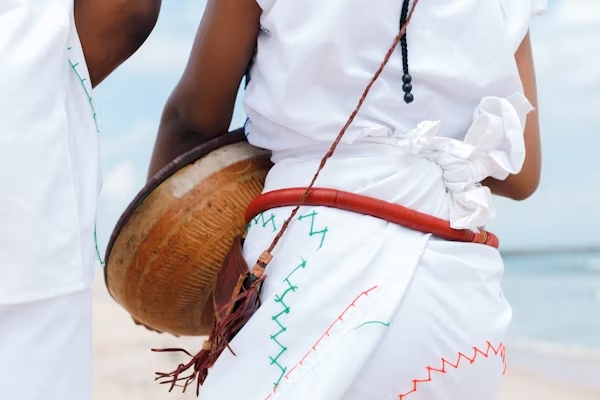Introduction
In the vast spiritual traditions of the Yoruba people and their Afro-Caribbean descendants, few figures are as central, complex, and respected as Elegua. Known as the guardian of crossroads, keeper of destiny, and messenger of transformation, Elegua occupies a vital role in rituals, daily prayers, and the very structure of spiritual life.
Recognized across Yoruba religion, Santería (Regla de Ocha), Candomblé, and other Afro-Caribbean practices, Elegua embodies duality: he is both mischievous and protective, playful yet powerful. Above all, he is the first Orisha invoked in ceremonies, for without his permission, communication with the divine is impossible.
This article explores the origins, symbolism, roles, and modern cultural significance of Elegua, shedding light on why he remains one of the most important figures in African diasporic spirituality.
Origins of Elegua
Yoruba Roots
Elegua, also called Èṣù-Èlegba, originates in the Yoruba religious system of West Africa, particularly in present-day Nigeria and Benin. He is one of the Orishas, divine entities that embody natural and cosmic forces.
In Yoruba cosmology:
-
Elegua is the divine messenger, bridging humans and the higher Orishas.
-
He rules over communication, movement, and the unfolding of destiny.
-
He is associated with Ase, the life force or divine energy that animates existence.
Diaspora and Transformation
Through the transatlantic slave trade, Yoruba traditions spread to the Caribbean and the Americas, blending with Catholicism and indigenous beliefs. In these new contexts:
-
In Santería (Cuba), Elegua is often syncretized with Saint Anthony of Padua or the Holy Child of Atocha.
-
In Candomblé (Brazil), he is known as Exu, celebrated with distinct rituals and iconography.
Despite regional differences, his essence as opener of paths and guardian of destiny has remained consistent.
Symbolism and Attributes
-
The Crossroads
-
Elegua is master of the crossroads, a place symbolizing choices, opportunities, and destiny.
-
Crossroads reflect his role as a liminal figure—standing between worlds, times, and possibilities.
-
-
Child and Elder
-
Elegua embodies both extremes of life: a mischievous child full of play and an old wise man carrying deep knowledge.
-
This duality reflects the Yoruba view of time as cyclical rather than linear.
-
-
Colors and Numbers
-
His sacred colors are red and black (or red and white in some traditions).
-
His numbers are 3 and 21, often seen in ritual offerings.
-
-
Sacred Objects
-
Elegua is often represented by a stone head with cowrie shells for eyes and mouth, placed at entrances to homes.
-
He is linked to keys, doors, and locks—symbols of his ability to open or close opportunities.
-
Roles of Elegua in Spiritual Life
-
Opener of Paths
-
No ceremony begins without honoring Elegua first. He opens the spiritual roads so prayers and offerings may reach the other Orishas.
-
-
Messenger and Trickster
-
Like Hermes in Greek mythology, Elegua is a messenger between humans and the divine.
-
As a trickster, he tests people, teaching lessons through challenges and unexpected events.
-
-
Guardian of Destiny
-
Elegua controls the flow of luck, fortune, and misfortune.
-
He teaches that human choices at the crossroads shape one’s path.
-
-
Protector of the Home
-
Placing an Elegua figure at the door is believed to guard against negativity and welcome positive energy.
-
Rituals and Offerings
Elegua is honored with offerings such as:
-
Candies, toys, and cigars (reflecting his childlike and playful side).
-
Rum, palm oil, and roasted corn.
-
Roosters and goats in more formal ritual sacrifices.
Rituals typically involve drumming, dancing, and chanting to invoke his presence. His sacred songs (oríkì in Yoruba) praise his power, ask for guidance, and express gratitude.
Elegua in Afro-Caribbean Culture
Santería (Cuba)
In Santería, Elegua is one of the most beloved and frequently invoked Orishas. Practitioners place his figure near doorways to ensure protection and good fortune. His role as the first Orisha makes him indispensable.
Candomblé (Brazil)
In Candomblé, Exu (the Brazilian expression of Elegua) is celebrated with fiery energy, drumming, and dance. Unlike the often-misunderstood view of him as “evil” in colonial interpretations, Exu is revered as a vital force of life and communication.
Haitian Vodou
Though distinct from Yoruba-based Orisha traditions, Vodou has a similar figure: Papa Legba, the guardian of crossroads and spiritual communication, showing the interconnectedness of African diasporic faiths.
Misinterpretations and Stereotypes
Colonial and missionary accounts often misrepresented Elegua (and Exu) as demonic figures, equating his trickster nature with evil. These misconceptions persist today but are being challenged by scholars and practitioners who highlight his true role as a guide, teacher, and protector.
Elegua is not a symbol of chaos without purpose—he represents the necessary uncertainty of life, reminding us that growth and transformation often come through challenges.
Modern Relevance
In today’s world, Elegua’s symbolism resonates beyond spiritual communities:
-
At the crossroads of decisions, people invoke his guidance as they face personal, professional, or existential choices.
-
As a cultural symbol, he embodies resilience, adaptability, and the wisdom of African heritage.
-
In artistic expression, musicians, writers, and visual artists reference Elegua to explore themes of destiny, transformation, and duality.
Elegua reminds us that life is full of transitions and choices, and that wisdom lies in navigating them with humility and respect for forces greater than ourselves.
Conclusion
Elegua, the guardian of crossroads, destiny, and transformation, continues to be one of the most vital figures in Yoruba and Afro-Caribbean traditions. His playful yet profound nature, his role as messenger and protector, and his timeless presence at the threshold of every decision make him a symbol of enduring spiritual relevance.
Far from being a relic of the past, Elegua speaks directly to modern life. He teaches us that every door we encounter holds lessons, every crossroad is a chance for growth, and every challenge can be transformed into opportunity.

